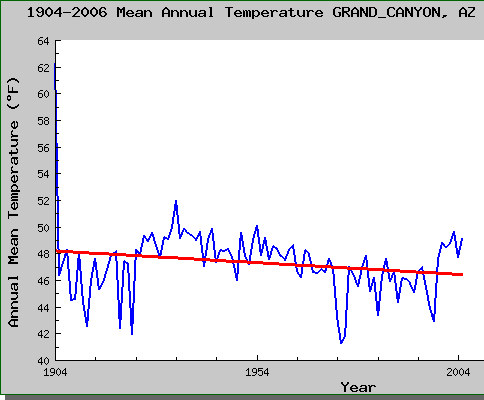I am still trying to get a copy of the article in Science on which this is based, but the AZ Republic writes:
Western forests that withstood wildfire, insect attacks and drought are now withering under an even greater menace.
Heat.
Rising temperatures are wiping out trees faster than the forests can replace them, killing pines, firs, hemlocks and almost every other kind of tree at almost every elevation from northern Arizona to southwestern Canada.
Writing today in the journal Science, a team of 11 researchers says global warming is almost certainly the culprit behind a sharp spike in tree deaths over the past several decades. The higher death rates, which doubled in as few as 17 years in some areas, coincide with a regional increase in temperature and appear unrelated to other outside factors.
Perhaps this question is answered somewhere in the unreported details, but my first reaction was to want to ask “Dendroclimatologists like Michael Mann reconstruct history from tree rings based on the assumption that increasing temperatures correlates linearly and positively with tree growth and therefore tree ring width. Your study seems to indicate the correlation between tree growth and temperature is negative and probably non-linear. Can you reconcile these claims?’ Seriously, there may be an explanation (different kinds of trees?) but after plastering the hockey stick all over the media for 10 years, no one even thinks to ask?
Normally, I just ignore the flood of such academic work (every study nowadays has global warming in it — if these guys had just wanted to study the forest, they would have struggled for grant money, but make it about forest and global warming and boom, here’s your money). The reasons I picked it out was because I just love the quote below — I can’t tell you how often I see this in climate science-related work:
Scientists combed more than 50 years of data that included tree counts and conditions. The sharp rise in tree mortality was apparent quickly. Researchers then eliminated possible causes for the tree deaths, such as air pollution, fire suppression or overgrowth. They concluded the most likely culprit was heat.
Again, I need to see the actual study, but this would not be the first time a climate study said “well, we investigated every cause we could think of, and none of them seemed to fit, so it must be global warming.” It’s a weird way to conduct science, assuming Co2 and warming are the default cause for every complex natural process. No direct causal relationship is needed with warming, all that is required is to eliminate any other possible causes. This means that the less well we understand any complex system, the more likely we are to determine changes in the system are somehow anthropogenic.
Speaking of anthropogenic, I am fairly certain that the authors have not even considered the most likely anthropogenic cause, if the source of the forest loss is even man-made at all. From my reading of the literature, nearby land use changes (clearing forests for agriculture, urbanization, etc) have a much greater affect on local climates and particularly moisture patterns than does a general global warming trend. If you clear all the surrounding forest, it is likely that the piece that is left is not as healthy as it would have been in the midst of other forested land.
The article, probably because it is making an Arizona connection, makes a big deal about the role of a study forest near Flagstaff in the study. But if the globe is warming, the area around Norther Arizona has not really been participating. The nearest station to the forest is the USHCN station at the Grand Canyon, a pretty decent analog because it is nearby, rural, and forested as well. Here is the plot of temperatures from that station:

Its hard to tell from the article, but my guess is that there is actually a hidden logic leap embedded. Likely, their finding is that drought has stressed trees and reduced growth. They then rely on other studies to say that this drought is due to global warming, so then they can get to the grant-tastic finding that global warming is hurting the forest. But the “western drought caused mainly by anthropogenic warming” is not a well proven connection. Warming likely has some contribution to it, but the west has been through wet-dry cycles for tens of thousands of years, and has been through much worse and longer droughts long before the Clampetts started pumping black gold from the ground.
